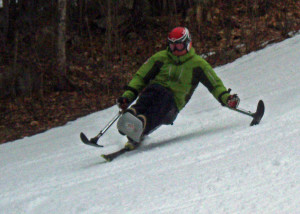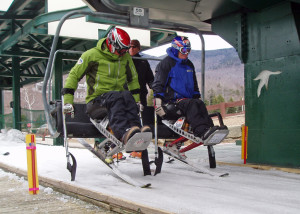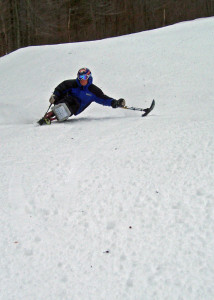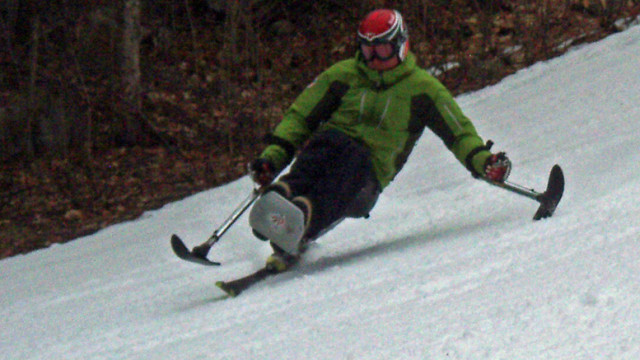
There’s no way to sugarcoat this to save my ego. Geoff Krill, the winter sports director at New England Disabled Sports at Loon Mountain and Cameron (Cam) Shaw-Doran, a Franconia, NH native and sales-rep for SoNu, a sports drink company, were kicking my butt. But, being very PC guys, they were subtly scrubbing speed, so an age-impaired companion (that would be me) who thought he liked to ski fast, could keep up. And they were both doing it without benefit of functioning legs—riding on sit skis (a seat with shock absorbers mounted on a single ski).

Most people would, I suppose, see these guys as “handicapped,” or “disabled”; both lost the use of their legs to spinal-chord injuries, Krill in a snowmobile mishap in 1995, Shaw-Doran in an automobile accident in 1997. But once you are on the slopes with them, it’s impossible to see them as anything other than fellow skiers—and darned good ones at that. They were active and athletic before their accidents, and by any measure, they still are. Both are high-level competitors on sit-skis. Thanks to adaptive technology, they can drive to a resort, get their ski out of the cars, and head for the lifts without any help from anyone.
“We aren’t heroes,” says Krill, “and we don’t want to be treated that way. In fact, it’s a little embarrassing when people come up to you and say what an inspiration you are. I’ve been a mentor for Cam and some other people facing challenges, but that’s just by example, showing that you can have a pretty cool life with a disability. I’d rather have people just see me getting out and doing what I want to do, enjoying life with friends.”

Do you get a little teary-eyed when you see an inspirational story of, say, a wheelchair-bound athlete competing in a marathon? “Well, get over it,” is the message from most of the athletes and outdoor enthusiasts with disabilities that I’ve talked to. The only people they want to be inspirations for are other folks facing similar challenges. To the non-challenged majority, they just want to be seen as people doing what they love and what they are good at, learning to be good at, or simply having fun with.
So the next time you see someone flying down the slopes on a sit ski, or on one leg with outriggers, or even a blind skier following a guide down the slopes, smile at them, say hi and talk about the skiing. Oh, and try and see if you can keep up . . .
Adaptive Snowsports Programs
If you have some sort of physical challenge that you think might keep you off the slopes, there are lots of GREAT programs that will be happy to prove to you that you can do it. Here are some:
F.S.H.E. / E.T.D.S.F. (Eastern Townships Disabled Skiers Foundation)
New England Disabled Sports at Loon Mountain
New England Handicapped Sports Association


